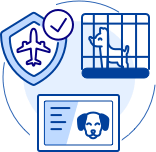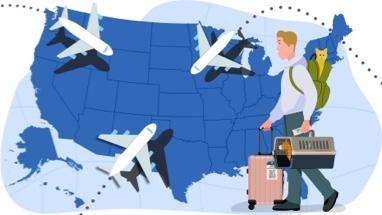Pet Travel From the United States to Mexico
Travel Requirements Based on Pet Type
Carefully read ALL of the requirements related to your pet on this page.
- This page provides the most recent entry requirements and can change without notice.
- It is the responsibility of the veterinarian to make sure the pet has met all health requirements of the destination country before issuing a health certificate.
- Failure to meet the requirements may result in problems gaining certificate endorsement or difficulties upon arrival in the destination country.
- Health certificates must be legible, accurate, and complete.
ALERT
As of November 22, 2024, Mexico is considered to be affected with screwworm. All dogs (including U.S. origin dogs returning to the U.S. after traveling to Mexico) must meet APHIS requirements for screwworm freedom certification upon entry (re-entry). Additional information can be found on the APHIS Dog Import website.
Effective 12/16/2019: A health certificate for dogs and cats is no longer needed to enter Mexico. Dogs and cats may be taken to the border without health certificate documentation, they will be inspected by SENASICA upon arrival. Please follow the guidance on this page.
ALERT
As of November 22, 2024, Mexico is considered to be affected with screwworm. All dogs (including U.S. origin dogs returning to the U.S. after traveling to Mexico) must meet APHIS requirements for screwworm freedom certification upon entry (re-entry). Additional information can be found on the APHIS Dog Import website.
Effective 12/16/2019: A health certificate for dogs and cats is no longer needed to enter Mexico. Dogs and cats may be taken to the border without health certificate documentation, they will be inspected by SENASICA upon arrival. Please follow the guidance on this page.
Requirements for dogs and cats originating in, and proceeding from, the United States of America to Mexico:
(Combinacion numbers 007-35-61-USA-USA and 013-08-504-USA-USA)
- Upon arrival to Mexico with the pet dog(s) and/or cat(s) in a clean cage(s)/carrier(s), travelers must visit the Mexican Animal and Plant Health Inspection Office (OISA), to contact the official personnel working with SENASICA. The official personnel will verify the following:
- That the dog(s) and/or cat(s) does/do not present signs of infectious and contagious diseases.
- The animal(s) is/are free of ectoparasites*.
- The animal(s) does/do not present fresh wounds or wounds in a healing process.
- *If at the physical inspection parasites are detected, the owner/user should contact a Veterinarian (anyone) in order he/she applies an appropriate treatment. If ticks are detected, the SENASICA personnel will take a sample of the ectoparasite(s) for its diagnostic at the official laboratory, and will verify that all parasites are removed from the pet(s). The animal(s) will remain at the OISA [Mexican official office] until confirmation that the parasites are not exotic/foreign to Mexico, or are not under an Animal Health Program (Campaign) in Mexico. Otherwise, SENASICA, through the Animal Health General Direction, will determine the measures to be applied. Expenses derived from such actions, should be paid by the importer.
Other requirements/information about inspection at the OISA, upon presentation of the shipment in Mexico:
- If your pet(s) is/are under treatment due to lesions and/or infections on the skin due to mites, dermatomycosis, dermatophylosis, hairless or similar lesions, you should present to the official personnel of SADER/SENASICA the diagnostic and treatment instructed by the Veterinarian. Such information should be presented in a letterhead, including the professional registration number (or equivalent). Enclosed to the letterhead, it can be accepted a copy of the professional registration number (or equivalent).
- Compliance of what is indicated in this document, does not exempt the importer of presenting documents, complying with applications and/or procedures requested by other authorities.
- When the cage/carrier is dirty and/or contains bed disposable (newspaper wood – other materials) toys or edible products, a disinfection will be applied, removing all that is inside of the carrier/cage, for a proper destruction.
- Only the portion of food used to feed the animal during the day of arrival, will be allowed.
This HRZ only applies to domestic dogs (Canis lupus familiaris), and domestic cats (felis catus).
NOTE: If you travel regularly between the U.S. and Mexico with your dog, you can request to register in the “Pet Program - Frequent Traveler”. For further information please contact the following phone numbers: 59051000 ext. 53611, 54326 and 51020, (0155) 43130154; 43130155 and 43130152.
Effective 12/16/2019: A health certificate for dogs and cats is no longer needed to enter Mexico. Dogs and cats may be taken to the border without health certificate documentation, they will be inspected by SENASICA upon arrival. Please follow the guidance on this page.
NOTE: Mexico has banned the importation of live birds originating from, and transiting through, States with a detection of Highly Pathogenic Avian Influenza in commercial poultry. Some States with detections may be eligible for export from counties free of HPAI. Please check with your Veterinary Export Trade Services office to confirm a State status for HPAI in commercial poultry.
Health certificates may be submitted by the USDA Accredited Veterinarian online through the Veterinary Export Health Certificate System (VEHCS); APHIS Digital Signature is accepted for Pet Birds to Mexico
IMPORTANT INSTRUCTIONS for preparing Health Certificates when traveling with your pet from the U.S. to Mexico.
The Health Certificate must...
- Be comprised of the health certificate document linked to the blue “international health certificate” button below. APHIS digital signature is accepted for this certificate and species.
- Include the number of the physical seal that will be applied the bird’s container by the USDA Accredited Veterinarian directly prior to departure.
- Be type written, or completed using a word processor or computer.
- Documents with handwritten information will be rejected.
- The number of the health certificate must be also typewritten or in a word processor or computer.
- Except for the abbreviations in the Consignor, Consignee, and Accredited Veterinarian and endorsing VMO fields, the HC must not contain abbreviations.
- This includes, but is not limited to:
- Dates - January" is accepted while "Jan" is not
- States - Must be the entire word and not the two-letter abbreviation
- Ages - "Months" or "Year" is accepted while "yrs" and "mos" are not
- All health certificates must be printed single-sided. Mexico will not accept double-sided printouts.
- Mexico will not accept hand-made corrections, erasures, line outs, or cross outs.
OTHER REQUIREMENTS
- The Security Inspection in Animal and Plant Health Official will carry out the physical inspection and review of documentation of the shipment.
- Complying with what is established in this document, does not exempt the importer of presenting documents to comply with other applications and/or procedures required by other authorities.
- The importer shall indicate in writing and under oath the destination of the commodity.
- At the inspection, the bird must be identified with numbered plaques or rings, located in the membrane of wings or legs, respectively. If birds are very small, they can be excluded (size less than 10 cm).
- It is not allowed entry of food, hay, straw, bed, feces or similar materials, accompanying the animals.
- The importer shall inform to the Animal Health General Direction (DGSA as per its name in Spanish), to the phone numbers 018007512100 or 55-5905-1000 Ext. 51242 or 51236 about any disease or death presented in the imported birds. DGSA will dictate all the sanitary measures to be followed. All expenses derived from this situation shall be paid by the importer/owner. During staying of the animals in the quarantine facilities, additional inspections, tests and treatments can be performed, based on the DGSA Official Veterinarian’s judgment.
- Shipment and documentation shall comply with dispositions established in Article 24, 32, and applicable parts of Article 89 of the Animal Health Federal Law.
- Within 30 days after importation, birds should not be moved from the destination indicated in your letter. Such condition can be verified by the Secretariat. Besides, additional inspections, tests and treatments can be performed, based on the DGSA Official Veterinarian’s judgment.
- Domestic movement shall comply with NOM-024-ZOO-1995 Animal Health Specifications and Characteristics to Transport Animals and Animal Products; Chemical, Pharmaceutical, Biological and Food products for animal feeding or animal consumption, and NOM-051-ZOO-1995, Humane Welfare for Animal Movement.
IMPORTANT INSTRUCTIONS for preparing Health Certificates when traveling with your pet from the U.S. to Mexico.
The Health Certificate must...
- Be type written, or completed using a word processor or computer.
- handwritten information will be rejected.
- The number of the health certificate must be also typewritten or in a word processor or computer.
- Except for the abbreviations in the Consignor, Consignee, and Accredited Veterinarian and endorsing VMO fields, the HC must not contain abbreviations.
- This includes, but is not limited to:
- Dates - January" is accepted while "Jan" is not
- States - Must be the entire word and not the two-letter abbreviation
- Ages - "Months" or "Year" is accepted while "yrs" and "mos" are not
- All health certificates must be printed single-sided. Mexico will not accept double-sided printouts.
- Mexico will not accept hand-made corrections, erasures, line outs, or cross outs.
Health certificates may be submitted by the USDA Accredited Veterinarian online through the Veterinary Export Health Certificate System (VEHCS); however, the APHIS Veterinary Medical Officer's ink (wet) signature with the application of the APHIS embossed seal must appear on the health final certificate. To accomplish this, certificates received by APHIS through the VEHCS system will be printed and endorsed in our offices, and the hard copy will be returned when complete. This APHIS-endorsed paper copy must accompany the shipment.
Health certificates may be submitted by the USDA Accredited Veterinarian online through the Veterinary Export Health Certificate System (VEHCS); however, the APHIS Veterinary Medical Officer's ink (wet) signature with the application of the APHIS embossed seal must appear on the health final certificate. To accomplish this, certificates received by APHIS through the VEHCS system will be printed and endorsed in our offices, and the hard copy will be returned when complete. This APHIS-endorsed paper copy must accompany the shipment.
IMPORTANT INSTRUCTIONS for preparing Health Certificates when traveling with your pet from the U.S. to Mexico.
The Health Certificate must...
- Be type written, or completed using a word processor or computer.
- handwritten information will be rejected.
- The number of the health certificate must be also typewritten or in a word processor or computer.
- Except for the abbreviations in the Consignor, Consignee, and Accredited Veterinarian and endorsing VMO fields, the HC must not contain abbreviations.
- This includes, but is not limited to:
- Dates - January" is accepted while "Jan" is not
- States - Must be the entire word and not the two-letter abbreviation
- Ages - "Months" or "Year" is accepted while "yrs" and "mos" are not
- All health certificates must be printed single-sided. Mexico will not accept double-sided printouts.
- Mexico will not accept hand-made corrections, erasures, line outs, or cross outs.
For pet travel requirements not listed, APHIS has not been officially informed by the foreign country about the requirements for your pet’s travel. We recommend that you contact a government official of the country you are traveling to for more information.
Country of Destination Contact Information
Note: As of April 23, 2010, due to a report of Rabbit Hemorrhagic Disease in the state of Minnesota, until further notice, Mexico will refuse entry of all non-research rabbits (including pet rabbits) from the United States.
Countries Participating in the European Union
Austria
Belgium
Bulgaria
Croatia
Cyprus
Czech Republic
Denmark
Estonia
Finland
France
Germany
Greece
Hungary
Republic of Ireland
Italy
Latvia
Lithuania
Luxembourg
Malta
Netherlands
Northern Ireland*
Norway**
Poland
Portugal
Romania
Slovakia
Slovenia
Spain
Sweden
Switzerland**
* Northern Ireland is part of the United Kingdom (UK), but will continue to follow European Union (EU) requirements even though the UK is no longer part of the EU.
** Norway and Switzerland are not part of the EU but have adopted EU legislation for import of most species of live animals.
Need Help?
Still Have Questions?
USDA-Accredited Veterinarians
Contact a USDA-accredited veterinarian for questions about your destination country's entry requirements for pets (including any needed vaccinations, tests, or treatments) and for issuance of health certificates.
Find a USDA-Accredited Veterinarian
USDA Endorsement Offices
Contact your nearest APHIS Veterinary Export Trade Services Endorsement Office for questions about endorsing a health certificate for pets.
For VEHCS help see the VEHCS help page. Routine APHIS VEHCS processing services are staffed Monday through Friday from 7:00 AM to 4:30 PM Central Time (CT) excluding federal holidays, the time listed in VEHCS reflects GMT.
Looking for Another Country?
Find your destination country requirements by using the dropdown menu below. If your country is not listed in the menu, visit Pet Travel: Unknown Requirements.




